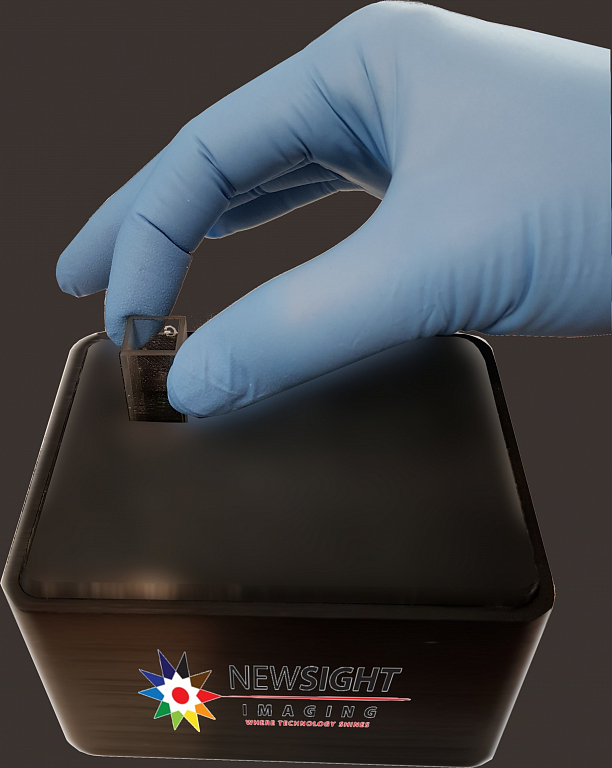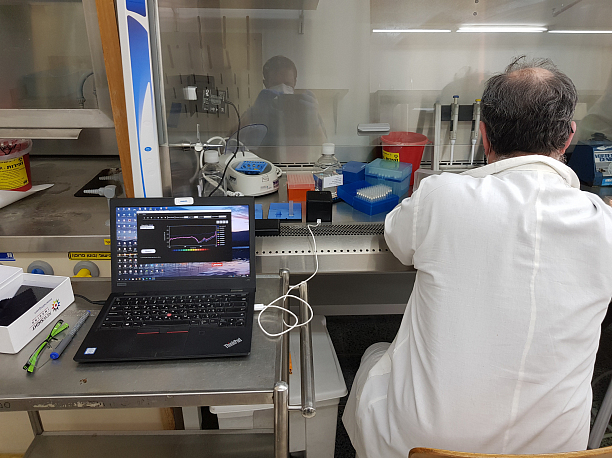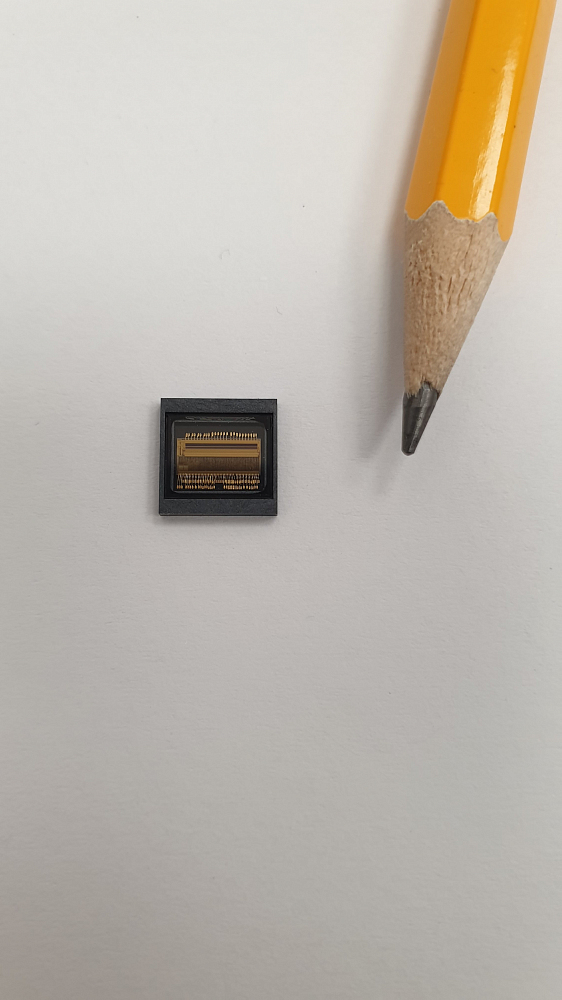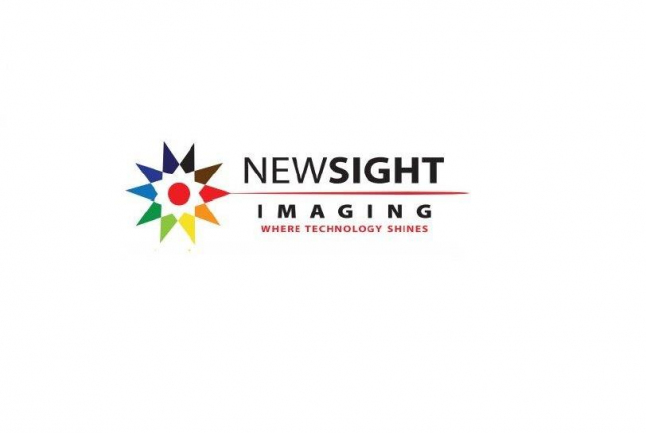46378
Newsight Imaging
Immediate portable diagnostic kit for Corona Virus
Israel
Market: Medicine, Other, Artificial Intelligence
Stage of the project: Prototype or product is ready
Date of last change: 21.05.2020
Israel
Market: Medicine, Other, Artificial Intelligence
Stage of the project: Prototype or product is ready
Date of last change: 21.05.2020
Idea
Newsight is working on the development of a portable At-home diagnostic kit that can identify corona virus infection in matter of seconds using light only, based on our spectrometer-on-chip solution. The device has an IOT interface, that will transmit results to the cloud and using AI run on a growing database and improve the accuracy of the detection algorithms on a daily basis.
We are collaborating with leading global institutes like Sheba medical center in Israel and other leading researchers from Hong Kong.
We are collaborating with leading global institutes like Sheba medical center in Israel and other leading researchers from Hong Kong.
Current Status
Newsight's chip is already fully functioning, and a POC has been built for other use cases of liquid, with the very same concept and building blocks. Newsight collaborates closely with Sheba hospital on the research of the right accurate markers in order to identify the virus infection using spectroscopy. The research is already in process, there is ongoing iterative work to determinate the best candidate of maker that can provide evidence that a person is infected. Several articles have been published about identification of both the viruses themselves and the inflammatory response to them using spectroscopy. The current POC was created for water analysis (heavy metals, bio situation) and after the presentation made to Mekorot, the Israeli water national water company, they accepted a joint prototype development that takes place these days. As for the market, Newsight already has a few companies who are very interested in licensing and distributing the final product. Most probably, the licensing will be in accordance with geographic territory. For example, Aviton company from HK (www.aviton.com) is interested in investing in Newsight due to this project and would like to acquire the license and make the devices for China/HK/Taiwan area.
Market
The overwhelming global spread of the Coronavirus caught the entire medical service sector unprepared. Apart from the resources needed to be invested in patient’s hospitality and breath support machinery, early detection, becomes the main focal point of every health organization around the globe.
Early and fast detection of the virus infection can lead to a rapid isolation of the infected population and prevent community infection which is the main cause of the pandemic.
Early January, at the start of the COVID-19 outbreak, a typical testing and verification of the virus lasted about three hours. Tests has been made using qPCR machines, which cost between 45,000$ to 55,000$, depends on the number of wells used in the machine. Additionally, to the basic cost, there are consumables that significantly increase the cost of each test. Buying qPCR, PCR Handbook. Buying qPCR
One other factor that contributed to the length of the test is the manpower, which must be highly trained and located in a special isolated lab located mostly in large medical centres.
All of the factors described above, which represent the current situation, prevents the health officials from a wide allocation of the testing and detecting points around the country which further increase the time consumed between the patient's sampling and the actual detection and verification of the virus. A typical time consumed between sampling and detection is between 5 to 24 hours and in some cases even 48 hours. The time includes the sampling process, the delivery to diagnostic facility and the actual diagnosis process in the current available devices like qPCR. Depends on each country regulation, the tested patient, while waiting for the test results, is either staying in hospital, sometime among other non-related patients or in-home isolation with other family members. Both options are contributing to the virus spread and infection. PCR Handbook
According to health officials, the efficiency of the early detection and its accessibility to as many testing and detection points as possible is a key factor in fighting the spread of the virus. To allow speed and a wide spread of the testing verification machines, the machine needs to be fast, have a low price point for the basic machine and the consumables and it needs to be easy to operate.
Newsight’s proposed solution, has a well proved feasibility and could very well answer the needs above.
Newsight’s proposed solution, has a well proved feasibility and could very well answer the needs above. Newsight is estimating the equipment cost to range between 1,000 euro for the single testing well and 5,000 euro for 100 wells machine. Consumables are estimated at approximately 1 euro at the early stages of deployment. The accuracy of the detection is based on a spectral signatures database, to whom the machine is comparing the results and creating an existent/non-existent result. As we are facing a large number of signatures in the tested substance, a reliable machine learning process and AI is required to make accurate detection.
AI is taking a significant role in the fight against the Coronavirus (AI To help in Coronavirus Detection). Newsight’s technology allows for tens of thousands of signatures to be acquired from the tested substance per second. These signatures, when being uploaded to the cloud, will contribute to the system’s machine learning which will lead to AI enabling better detection and improved accuracy. Outcome from the AI process is being uploaded back to the detecting machine which becomes “smarter” over time. The proposed solution could bring significant impact on the market, by allowing medical facility and staff to use a device which is constantly updated with new diagnosis factors and be able to provide a quick testing result. The single well device could be deployed among private clinics, emergency medical staff and in any testing points which will be deployed in emergency. At a later stage, the same device could be uploaded with diagnosis factors for other viruses as well.
Early and fast detection of the virus infection can lead to a rapid isolation of the infected population and prevent community infection which is the main cause of the pandemic.
Early January, at the start of the COVID-19 outbreak, a typical testing and verification of the virus lasted about three hours. Tests has been made using qPCR machines, which cost between 45,000$ to 55,000$, depends on the number of wells used in the machine. Additionally, to the basic cost, there are consumables that significantly increase the cost of each test. Buying qPCR, PCR Handbook. Buying qPCR
One other factor that contributed to the length of the test is the manpower, which must be highly trained and located in a special isolated lab located mostly in large medical centres.
All of the factors described above, which represent the current situation, prevents the health officials from a wide allocation of the testing and detecting points around the country which further increase the time consumed between the patient's sampling and the actual detection and verification of the virus. A typical time consumed between sampling and detection is between 5 to 24 hours and in some cases even 48 hours. The time includes the sampling process, the delivery to diagnostic facility and the actual diagnosis process in the current available devices like qPCR. Depends on each country regulation, the tested patient, while waiting for the test results, is either staying in hospital, sometime among other non-related patients or in-home isolation with other family members. Both options are contributing to the virus spread and infection. PCR Handbook
According to health officials, the efficiency of the early detection and its accessibility to as many testing and detection points as possible is a key factor in fighting the spread of the virus. To allow speed and a wide spread of the testing verification machines, the machine needs to be fast, have a low price point for the basic machine and the consumables and it needs to be easy to operate.
Newsight’s proposed solution, has a well proved feasibility and could very well answer the needs above.
Newsight’s proposed solution, has a well proved feasibility and could very well answer the needs above. Newsight is estimating the equipment cost to range between 1,000 euro for the single testing well and 5,000 euro for 100 wells machine. Consumables are estimated at approximately 1 euro at the early stages of deployment. The accuracy of the detection is based on a spectral signatures database, to whom the machine is comparing the results and creating an existent/non-existent result. As we are facing a large number of signatures in the tested substance, a reliable machine learning process and AI is required to make accurate detection.
AI is taking a significant role in the fight against the Coronavirus (AI To help in Coronavirus Detection). Newsight’s technology allows for tens of thousands of signatures to be acquired from the tested substance per second. These signatures, when being uploaded to the cloud, will contribute to the system’s machine learning which will lead to AI enabling better detection and improved accuracy. Outcome from the AI process is being uploaded back to the detecting machine which becomes “smarter” over time. The proposed solution could bring significant impact on the market, by allowing medical facility and staff to use a device which is constantly updated with new diagnosis factors and be able to provide a quick testing result. The single well device could be deployed among private clinics, emergency medical staff and in any testing points which will be deployed in emergency. At a later stage, the same device could be uploaded with diagnosis factors for other viruses as well.
Problem or Opportunity
Newsight's idea is to develop a small factor device, based on its spectrometer-on-chip solution, that will analyze human sample (spit or blood) by light only, in a matter of less than one second and with very cheap disposable cuvette, and will determine if the person is infected by virus or only is suspected as such. The technology behind it is well established, as there are spectrometers in labs that can identify viruses today, but these devices are neither portable nor affordable. We created a device with our chip on one side, and an LED light source on the other side, and use advanced algorithms and our proprietary spectrometer-on-chip to prove we can identify materials in very high accuracy. Newsight is collaborating with the biggest medical center in Israel, Sheba hospital, who has access to virus-related research, and will guide Newsight on how to correctly build the device for best detection. Newsight intends to engage with some medical equipment makers, and currently, a few players are already in dialog with Newsight, then we intent to license the technology providing the reference design we will develop, and also sell the spectrometer-on-chip. In summary, the income model will come from license fees, selling chips, and professional services related to the system maintenance and use of Newsight's technology. The sale of B2B to such major players is expected to yield revenues in a very short term after the success of the first prototype.
Solution (product or service)
Newsight has developed a spectrometer-on-chip, a tiny chip that can support immediate diagnosis of the virus markers in less than a second. Newsight builds a portable, small factor, accurate, and safe device that can be used in every clinic or every home. The device that is based on the chip was already demonstrated for another use case (water inspection) so we are starting from a strong base of ready-to-go POC device at the level of TRL-6. The device's price to final customer will be between 500-1000 USD each, and the idea is that all devices will be connected to the internet cloud, sending the checked data into one big dataset that will be built on the cloud while AI algorithms are running constantly. It will also provide firmware updates to the devices to increase accuracy and to support virus mutations or new viruses detection. Newsight already demonstrated its excellence: in less than four years, the company released three successful chips, two of them in mass production, recieved four grants from the Israeli innovation authority, raised close to 15M USD, won Garthner "cool vendor" and many other rewards, and is now collaborating with leading academic and medical organizations in Israel (such as Sheba medical center), trying to provide a quick diagnosis solution. Our device could have a great impact on humanity health, as well as making Newsight Imaging a unicorn start-up.
Competitors
Current solutions:
Early January, at the start of the COVID-19 outbreak, a typical testing and verification of the virus lasted about three hours. Tests has been made using qPCR machines, which cost between 45,000$ to 55,000$, depends on the number of wells used in the machine. Additionally, to the basic cost, there are consumables that significantly increase the cost of each test. Buying qPCR, PCR Handbook. Buying qPCR
One other factor that contributed to the length of the test is the manpower, which must be highly trained and located in a special isolated lab located mostly in large medical centres.
All of the factors described above, which represent the current situation, prevents the health officials from a wide allocation of the testing and detecting points around the country which further increase the time consumed between the patient's sampling and the actual detection and verification of the virus. A typical time consumed between sampling and detection is between 5 to 24 hours and in some cases even 48 hours. The time includes the sampling process, the delivery to diagnostic facility and the actual diagnosis process in the current available devices like qPCR. Depends on each country regulation, the tested patient, while waiting for the test results, is either staying in hospital, sometime among other non-related patients or in-home isolation with other family members. Both options are contributing to the virus spread and infection. PCR Handbook
According to health officials, the efficiency of the early detection and its accessibility to as many testing and detection points as possible is a key factor in fighting the spread of the virus. To allow speed and a wide spread of the testing verification machines, the machine needs to be fast, have a low price point for the basic machine and the consumables and it needs to be easy to operate.
Early January, at the start of the COVID-19 outbreak, a typical testing and verification of the virus lasted about three hours. Tests has been made using qPCR machines, which cost between 45,000$ to 55,000$, depends on the number of wells used in the machine. Additionally, to the basic cost, there are consumables that significantly increase the cost of each test. Buying qPCR, PCR Handbook. Buying qPCR
One other factor that contributed to the length of the test is the manpower, which must be highly trained and located in a special isolated lab located mostly in large medical centres.
All of the factors described above, which represent the current situation, prevents the health officials from a wide allocation of the testing and detecting points around the country which further increase the time consumed between the patient's sampling and the actual detection and verification of the virus. A typical time consumed between sampling and detection is between 5 to 24 hours and in some cases even 48 hours. The time includes the sampling process, the delivery to diagnostic facility and the actual diagnosis process in the current available devices like qPCR. Depends on each country regulation, the tested patient, while waiting for the test results, is either staying in hospital, sometime among other non-related patients or in-home isolation with other family members. Both options are contributing to the virus spread and infection. PCR Handbook
According to health officials, the efficiency of the early detection and its accessibility to as many testing and detection points as possible is a key factor in fighting the spread of the virus. To allow speed and a wide spread of the testing verification machines, the machine needs to be fast, have a low price point for the basic machine and the consumables and it needs to be easy to operate.
Advantages or differentiators
Newsight's solution has the following notable advantages over the current solutions:
• Portability: The device is based on a small LED light source and a printed circuit board (PCB) with Newsight's spectrometer-on-chip in it. We expect the size to be no bigger than a computer mouse comparing to half-room solutions that exists in today's market.
• Cost-effectiveness: We can expect the full device to reach no more than 1K USD per unit, and when in very high volume, can cost less than 300 USD a piece to the final customer. Compared to other solutions that can start in a scale of 100K USD and above.
• Performance: The device is expected to be able to trace the markers in matter of seconds, compared to hours it requires today. It will also be connected to the cloud hence get improved every time that AI software, which runs on the dataset, identifies such improvement and will generate a firmware updates to all devices across the world.
• Safety: Newsight solution can prevent cases of medical staff getting infected; it uses light reflection and works through the glass of the cuvette. This allows doctors to check in fully isolated conditions.
• Portability: The device is based on a small LED light source and a printed circuit board (PCB) with Newsight's spectrometer-on-chip in it. We expect the size to be no bigger than a computer mouse comparing to half-room solutions that exists in today's market.
• Cost-effectiveness: We can expect the full device to reach no more than 1K USD per unit, and when in very high volume, can cost less than 300 USD a piece to the final customer. Compared to other solutions that can start in a scale of 100K USD and above.
• Performance: The device is expected to be able to trace the markers in matter of seconds, compared to hours it requires today. It will also be connected to the cloud hence get improved every time that AI software, which runs on the dataset, identifies such improvement and will generate a firmware updates to all devices across the world.
• Safety: Newsight solution can prevent cases of medical staff getting infected; it uses light reflection and works through the glass of the cuvette. This allows doctors to check in fully isolated conditions.
Finance
Currently, Newsight's sales and business is coming majorly from machine vision 3D verticals such as automotive (headlight AFS project with ZKW Austria), industry 4.0 related applications, or robotics. When we get this project done, Newsight's main growth engine will become spectral analysis applications. Newsight will be able to enter vast opportunities in the medical field starting from virus and bacteria detection, going through blood tests, even bone marrow sampling as required by one of our medical partners in Israel. The company is expected to become a unicorn worth and could be a major player in tomorrow's challenges regarding healthcare, green technologies (water inspection), and food inspection. A simple calculation can be done as followed: assuming Newsight's share of every device sold is 200 USD, multipe 200 by at least 1M devices sold in the next two years, brings the revenues of this use case to 200M USD. And it is an extremely conservative estimation. Newsight could become a unicorn company very soon.
Business model
The revenue model will be based on the following:
1) Selling of spectrometer chips which are Newsight’s standard CMOS Image sensors equipped with special spectral filters supporting the virus detection.
2) Commission on disposals - per test.
3) Licensing fees for the algorithm supporting the detection.
4) Annual fees for SW and algorithm updates.
1) Selling of spectrometer chips which are Newsight’s standard CMOS Image sensors equipped with special spectral filters supporting the virus detection.
2) Commission on disposals - per test.
3) Licensing fees for the algorithm supporting the detection.
4) Annual fees for SW and algorithm updates.
Money will be spent on
1. Research for the best accurate markers to identify virus infection
2. Improving current prototype to final product stage
3. Full Demo including the cloud and AI software, final algorithmics development.
4. Commercialization and go-to-market
2. Improving current prototype to final product stage
3. Full Demo including the cloud and AI software, final algorithmics development.
4. Commercialization and go-to-market
Team or Management
Won the competition and other awards
Newsight Imaging develops advanced CMOS Image sensor chips for two main applications : 3D Depth camera sensors serving verticals such as Mobile, Robotics, Industry 4.0, Automotive Safety and Surveillance. Newsight sold more than 200,000 chips to machine vision market and conducted successful POC’s with leading global companies. The second application is a spectrometer on chip providing affordable quality inspection solutions for Medical Industries ,Water, Food& Beverage and other variety of materials. Newsight using its special sensor technology enables complicated and expensive technologies to be accessible to the mass production market, providing a portable and affordable solution without compromising on their quality.
Founded in 2016, Newsight’s team with more than 26 years of experience each, already managed to release 4 sensor chips to the market, raise 15M USD from strategic and financial investors and sells in high volume with a big pipeline of customers. The company has 7 US patents, named “Cool Vendor” in the Nobel sensors category by Gartner and received 3 grants by the Israeli Innovation Authority. The company has validated its spectral chip technology during its work on different projects such as water quality monitoring device development based on its spectral technology in collaboration with Israeli national water company “Mekorot”.
Founded in 2016, Newsight’s team with more than 26 years of experience each, already managed to release 4 sensor chips to the market, raise 15M USD from strategic and financial investors and sells in high volume with a big pipeline of customers. The company has 7 US patents, named “Cool Vendor” in the Nobel sensors category by Gartner and received 3 grants by the Israeli Innovation Authority. The company has validated its spectral chip technology during its work on different projects such as water quality monitoring device development based on its spectral technology in collaboration with Israeli national water company “Mekorot”.
Photos



Product Video
Presentation
Sign in/Sign up
